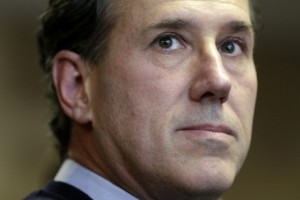 The surprising results of Tuesday’s Iowa caucuses have reinforced the conventional wisdom about this season’s Republican primary battle: Nothing about this race is conventional.
The surprising results of Tuesday’s Iowa caucuses have reinforced the conventional wisdom about this season’s Republican primary battle: Nothing about this race is conventional.
Presumptive frontrunner former Massachusetts Gov. Mitt Romney won Iowa — but by only eight votes. Former Pennsylvania Sen. Rick Santorum stole Romney’s thunder with a come-from-behind quasi-victory that catapulted him from political afterthought to potential nominee. U.S. Rep. Ron Paul of Texas, meanwhile, proved that while this fringe libertarian still stands almost no chance of securing a spot on the GOP ticket, the passion of his supporters is powerful enough to make him a nuisance to more serious contenders for months to come.
The Iowa caucuses long have been known more for eliminating electoral losers than anointing winners. Just ask former Gov. Mike Huckabee, R-Ark., or former U.S. Rep. Dick Gephardt, D-St. Louis, both of whom came roaring out of Iowa as victors, only to see their presidential prospects evaporate in other states.
Even Iowa’s losers often do better than the caucus results would suggest. Think of then-Sen. Hillary Clinton, D-N.Y., whose campaign was pronounced dead on arrival after her third-place showing in the Hawkeye State in 2008 but quickly was revived by a New Hampshire victory that set her up for a prolonged duel with Barack Obama. Or consider the case of Arizona Sen. John McCain, who came in a distant third in Iowa but went on to win the 2008 Republican nomination.
This time around, it’s unclear how well the Iowa caucuses have done their job of winnowing a fractious and overcrowded Republican field. Former frontrunner and Ames Straw Poll winner Rep. Michele Bachmann bowed out of the race Wednesday morning after finishing sixth in Iowa. But Texas Gov. Rick Perry, another former frontrunner whose appeal ended when the debates began, has sent mixed signals about his intentions after finishing fifth. Former Speaker of the House Newt Gingrich, meanwhile, seems bent on staying in the race despite his precipitous drop in the polls and fourth-place finish, if for no other reason than to spite Romney for the negative ads that came Gingrich’s way via a Romney-friendly political action committee.
For Republicans hoping to coalesce quickly around a viable nominee and get on with the work of defeating Obama, the lingering presence in the race of so many erstwhile frontrunners and also-rans is not good news. Neither gaffe-prone Perry, baggage-laden Gingrich or conspiracy theorist Paul is likely to win the nomination, much less the presidency. But their refusal to accept defeat means that Republican primary voters trying to decide between Romney and Santorum — the latest and most serious Romney alternative to emerge thus far — will continue to be distracted by candidates who siphon their attention and votes while making Obama’s job of tarnishing the eventual nominee that much easier.
Still, the volatile Iowa contest and the dizzying months preceding it have not been without their lessons. Perhaps the most important is this: The meteoric rise and fall of so many short-lived GOP frontrunners and would-be contenders has served as a much-needed reminder that political outsiders are not all they are cracked up to be.
In this era of record-low congressional approval ratings and record-high disdain for big government, it’s tempting to assume that the candidate who has spent the least time in politics is most likely to do the best job in the Oval Office. In reality, nominating a political novice to run for the highest political office in the land makes no more sense than hiring a newly minted graduate to litigate your company’s most important case or manage its most important assets. Sure, he might be a prodigious talent whose fresh ideas help him see new possibilities that old hands miss. He might also get eaten for lunch or make catastrophic mistakes.
That’s the Republican rap on Obama: That our sky-high unemployment rates, still-anemic economy and the president’s own lackluster approval ratings prove that this former community organizer and single-term senator with no significant legislation to his name was not ready for the big leagues. Republican primary voters should remember that rap when choosing their own nominee.
In politics, charisma and creativity count. But when it comes to governing, there’s no substitute for experience, maturity and a track record of success.
(© 2011 Colleen Carroll Campbell)



